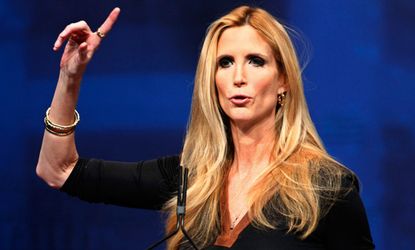The GOP will survive immigration amnesty
The Republican Party will just do what it always does: adapt


Republicans and the White House are tip-toeing near comprehensive immigration reform again. And the familiar debates are kicking up about what immigration's ongoing transformation of America will mean, with some fretting that amnesty will make future law enforcement impossible and others that an ongoing wave of immigration will make America a poorer and more socially stratified society. The latter worry is probably right. But one kind of immigration alarmism is almost certainly wrong.
Some believe that comprehensive reform or amnesty of any kind means the end of the Republican Party. Ann Coulter writes:
For at least a century, there's never been a period when a majority of immigrants weren't Democrats.
At the current accelerated rate of immigration — 1.1 million new immigrants every year — Republicans will be a fringe party in about a decade. [AnnCoulter.com]
Coulter pulls together some impressive poling evidence to show that immigrants and naturalized U.S. citizens typically agree more with liberal ideas about government than conservative ones. "No wonder they vote for Democrats 2-1," she writes.
Subscribe to The Week
Escape your echo chamber. Get the facts behind the news, plus analysis from multiple perspectives.

Sign up for The Week's Free Newsletters
From our morning news briefing to a weekly Good News Newsletter, get the best of The Week delivered directly to your inbox.
From our morning news briefing to a weekly Good News Newsletter, get the best of The Week delivered directly to your inbox.
But of course, if amnesty and an increase in legal immigration pass, the Republican Party will adapt. Parties don't doggedly hold on to vote-losing principles — they just find new vote-winning principles. Former constituencies find their old causes transmuted into new ones, and new political alliances are formed.
This has happened before. The Republican Party was also the more nativist party overall in the 19th century, deriding the Democrats as the party of "Rum, Romanism, and Rebellion." Anti-immigrant and anti-Catholic sentiment was so strong mid-century that major deadly riots broke out around Boston and Philadelphia. The anti-Catholic riot in Louisville had a higher body count than John Brown's anti-slavery raid. When the Whigs and Know Nothings collapsed, their members in the North typically migrated to the Republican Party.
For a number of reasons, immigration subsided but anti-immigration political sentiment didn't attain its crowning political victories until the 1920s. Along the way, Republicans transmuted their anti-immigration instincts into other Progressive era causes of "Americanizing" the great wave of immigration that had come to our shores. Some of these measures strike us now as needlessly invasive. But the fact remains: Even though anti-immigrant sentiment was far more intense and violent in the 19th century, the Republican Party that became its political home managed to survive.
In a startling and occasionally distressing speech given in Columbia in 1914, Charles Francis Adams, a member of the Lincoln administration and descendent of President Adams said:
So far from seven or 14 years making an American citizen, fully and thoroughly impregnated with American ideals to the exclusion of all others, our experience is that it requires at least three generations to eliminate what may be termed the 'hyphen' in citizenship.
Adams believed that at least three generations needed to pass until Irish Americans viewed the United States as their home, and George Washington as the father of "their" country.
His insight was borne out by the fact that immigrant groups do eventually find themselves able to vote for the party that historically opposed their entry. Although Coulter is right that immigrants have gravitated to the Democrats, the descendants of the 19th century great wave voted overwhelmingly for Nixon and Reagan. Many of them have come to view themselves as true conservatives, even if a century earlier America's true conservatives wanted to ship their great grandparents back to Europe.
But what Adams does not as readily admit is that the parties and ideals of the American people adapt as much as the immigrants themselves do. The great ideological movements of American progressivism and conservatism are important, but they come and go. The parties, on the other hand, stick around.
The relationship between the composition of the American people and the ideals adopted by the parties that seek to represent portions of them is complex. We cannot predict how the addition of new immigrants will pressure and cleave the Democratic coalition. But, in general, our two political parties have accumulated so much inherited power, including the power to change, that it is difficult to imagine either of them ever being mortally wounded.
So when Americans want to participate in politics, they find their inclinations shaped by the major parties. An Evangelical may have no natural interest in keeping corporate America well-fed. And a young, single feminist may never see her interests intersect deeply with organized labor. But the very inclination to participate in American public life translates into a desire to be a member of one of the two parties that actually exist and have a chance of exercising power. The Evangelical finds himself suddenly sympathetic to free-market rhetoric, and the feminist to the social justice claims of factory workers.
Whatever mass immigration does to transform America, the Republican Party will find a way to live. It will likely find new ways to be conservative, and over time it will attract the grandsons and granddaughters of today's immigrants.
Sign up for Today's Best Articles in your inbox
A free daily email with the biggest news stories of the day – and the best features from TheWeek.com
Michael Brendan Dougherty is senior correspondent at TheWeek.com. He is the founder and editor of The Slurve, a newsletter about baseball. His work has appeared in The New York Times Magazine, ESPN Magazine, Slate and The American Conservative.
-
 Women are getting their own baseball league again
Women are getting their own baseball league againIn the Spotlight The league is on track to debut in 2026
By Justin Klawans, The Week US Published
-
 Giant TVs are becoming the next big retail commodity
Giant TVs are becoming the next big retail commodityUnder the Radar Some manufacturers are introducing TVs over 8 feet long
By Justin Klawans, The Week US Published
-
 When will mortgage rates finally start coming down?
When will mortgage rates finally start coming down?The Explainer Much to potential homebuyers' chagrin, mortgage rates are still elevated
By Becca Stanek, The Week US Published
-
 US election: who the billionaires are backing
US election: who the billionaires are backingThe Explainer More have endorsed Kamala Harris than Donald Trump, but among the 'ultra-rich' the split is more even
By Harriet Marsden, The Week UK Published
-
 US election: where things stand with one week to go
US election: where things stand with one week to goThe Explainer Harris' lead in the polls has been narrowing in Trump's favour, but her campaign remains 'cautiously optimistic'
By Harriet Marsden, The Week UK Published
-
 Is Trump okay?
Is Trump okay?Today's Big Question Former president's mental fitness and alleged cognitive decline firmly back in the spotlight after 'bizarre' town hall event
By Harriet Marsden, The Week UK Published
-
 The life and times of Kamala Harris
The life and times of Kamala HarrisThe Explainer The vice-president is narrowly leading the race to become the next US president. How did she get to where she is now?
By The Week UK Published
-
 Will 'weirdly civil' VP debate move dial in US election?
Will 'weirdly civil' VP debate move dial in US election?Today's Big Question 'Diametrically opposed' candidates showed 'a lot of commonality' on some issues, but offered competing visions for America's future and democracy
By Harriet Marsden, The Week UK Published
-
 1 of 6 'Trump Train' drivers liable in Biden bus blockade
1 of 6 'Trump Train' drivers liable in Biden bus blockadeSpeed Read Only one of the accused was found liable in the case concerning the deliberate slowing of a 2020 Biden campaign bus
By Peter Weber, The Week US Published
-
 How could J.D. Vance impact the special relationship?
How could J.D. Vance impact the special relationship?Today's Big Question Trump's hawkish pick for VP said UK is the first 'truly Islamist country' with a nuclear weapon
By Harriet Marsden, The Week UK Published
-
 Biden, Trump urge calm after assassination attempt
Biden, Trump urge calm after assassination attemptSpeed Reads A 20-year-old gunman grazed Trump's ear and fatally shot a rally attendee on Saturday
By Peter Weber, The Week US Published